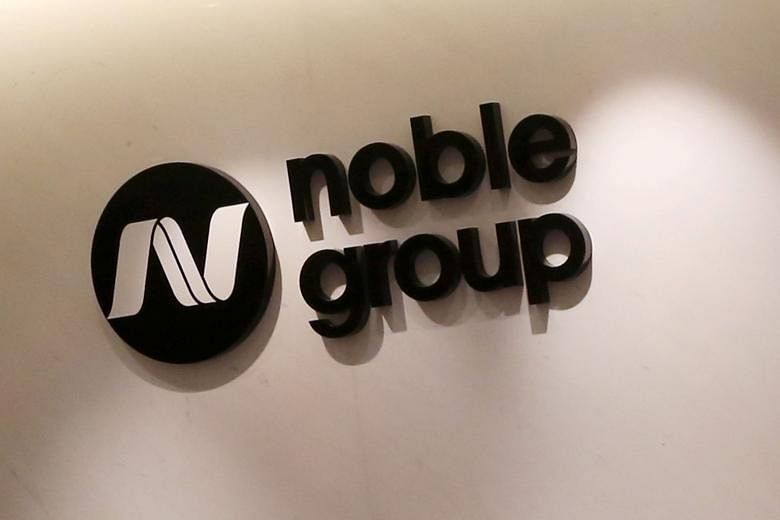SINGAPORE - Unsustainably high financing costs will place Noble Group's future at risk even after its proposed restructuring, Iceberg Research said on Friday (April 6) as it reiterated its call to replace the commodity company's management.
That came as Noble substantial shareholder Goldilocks Investment Company raised concerns that Noble's board may no longer represent shareholders' interests after the recent appointment of three UK-based directors.
The restructuring plan has "zero chance of success", said Iceberg, the research outfit that first raised questions about Noble's accounting methods three years ago.
Under Noble's restructuring plan, the group will issue three new bonds totalling US$1.655 billion, with two paying an annual coupon of 9.75 per cent after 18 months and a third paying a 10 per cent annual coupon.
"In commodity trading, you cannot afford bonds with coupon of 10 per cent," Iceberg wrote in a post on Friday. "This is a very low margin industry and the assumption that Noble with its cash flow generation will be able to pay this kind of interest is nonsense."
Given the post-restructuring debt of US$1.655 billion, such coupon rates mean that Noble will pay about US$165 million in interest expenses each year, on top of interest for the new US$700 million trade finance facility."Financing costs post-restructuring (more than US$165m) will be close to what they were before the restructuring (US$212m) even though debt is halved," said Iceberg.
It also noted that while Noble has promised a pro-forma earnigns before interest, tax, depreciation and amortisation (Ebitda) of US$175 million to US$200 million a year, the continuing operations that would become the new Noble had bled US$300 million in cash last year.
If Noble fails to pay the coupon on its bonds, the price of Noble's securities - bonds, shares, perpetual bonds - will collapse once again, said Iceberg.
It further alleged that the management had submitted the restructuring plan, despite it being unviable, in order to secure full legal release from any liability.
Noble's restructuring plan includes a clause that releases the group, its management, and the ad hoc group of creditors - as well as their employees, agents, advisors and representatives - from the claims of existing senior creditors. For Noble's managers, "the whole restructuring revolves around this clause", said Iceberg.
The ad hoc group of creditors would gain from the restructuring through the 5 per cent fee on their share of the US$700 million trade facility, and 2 per cent of the face value of the debt they hold. These creditors would likely sell their shares and subordinated bonds as soon as possible, it added.
Meanwhile, the controversy around the large equity Noble's management will get in new Noble is missing the point, according to Iceberg.
"Everybody seems to fight for a piece of the cake but they don't realise that there is no cake anymore. The price of the shares will ultimately plunge to zero once shareholders see there is no money left because financing costs are too high."
The alternative for Noble's investors will be to seek value outside the company such as through lawsuits, it said, adding that for investors to recover value inside the firm, Noble will have to appoint a new management with commodity backgrounds.
Meanwhile, Goldilocks, Noble's third largest shareholder, said that Noble's board is "no longer representative" of the company's stakeholders after a number of recent membership changes.
Noble has appointed three UK-based restructuring specialists - Andrew Herd, Tim Isaacs and Fraser Pearce - as independent non-executive directors with effect from April 4.
At the same time, Benjamin Bao Jianmin, a representative of Noble's major shareholder China Investment Corporation , stepped down from the board for "personal reasons". He had been appointed to Noble as a non-executive director on May 11 last year.
Executive chairman Paul Brough had said the new directors will strengthen the board as the firm works through the final phase of its proposed restructuring.
Goldilocks questioned these appointments, given that the three individuals, being residents in the United Kingdom, "do not have any prior experience as directors of a public listed company in Singapore".
It added that it was concerned these appointments seemed to only serve the purpose of facilitating a move to the UK to implement the restructuring.
The Abu Dhabi-based fund also called on the board to disclose clearly all rescue proposals made to the board, including the specific alternative proposals made to provide ongoing finance facilities, and to explain why these proposals were not pursued.
A group of Noble's perpetual bondholders had reportedly proposed a four-year US$700 million committed trade finance facility at "considerably lower cost" than what Noble has struck with its senior unsecured creditors. Noble, however, has not released any details on this.
"Full, complete and urgent disclosure needs to be made and coherent justifications need to be provided by the Noble board and by the Ad Hoc Group in this regard," said Goldilocks.

